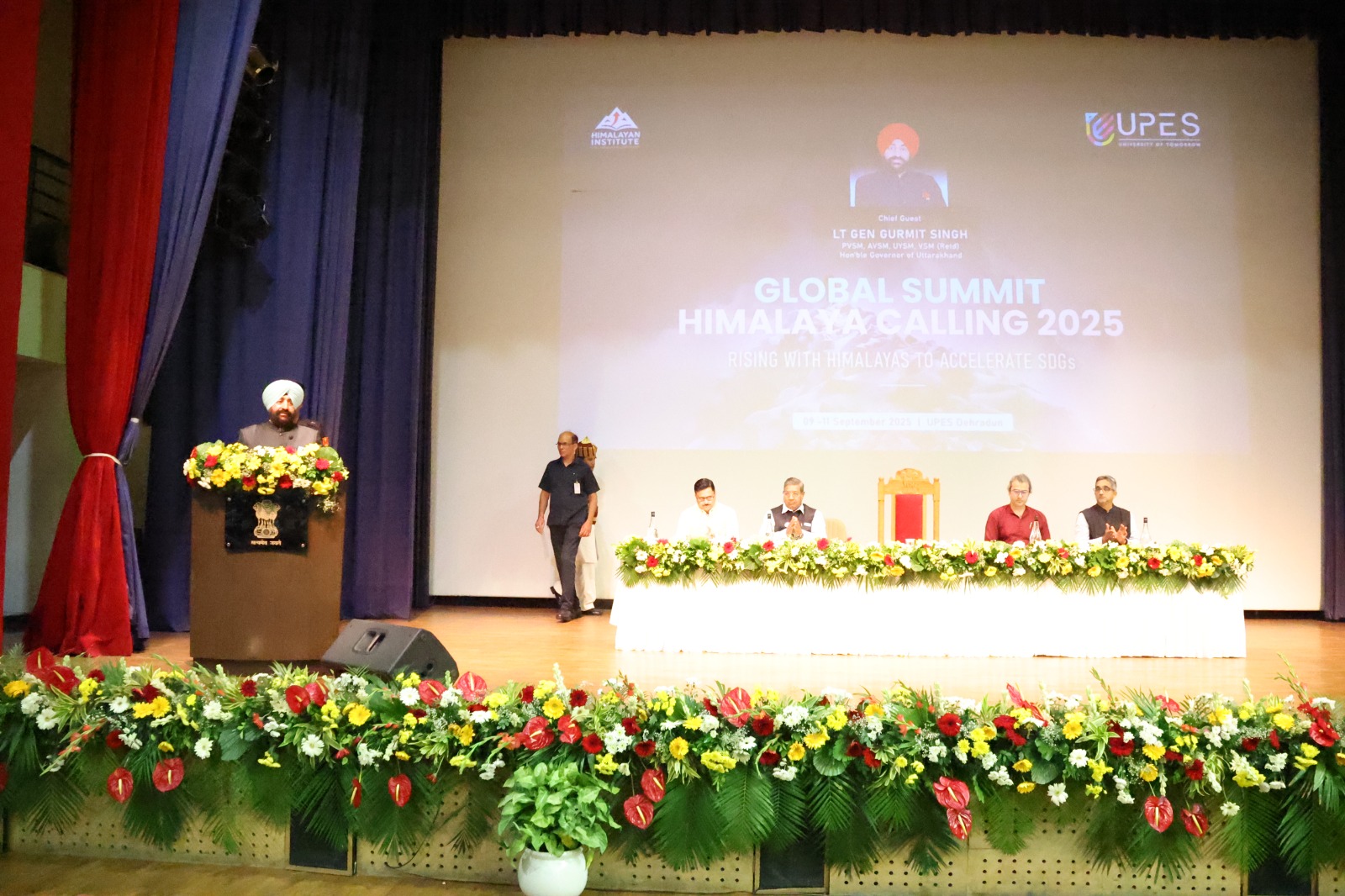
early times report
Dehradun, Sept 9: Today UPES, inaugurated Himalaya Calling 2025—a three-day global summit hosted by the Himalayan Institute for Learning & Leadership (HILL) at UPES, Dehradun—under the theme “Rising with Himalayas to Accelerate SDGs.” Designed as UPES’s annual celebration of the Himalayan region’s cultural, environmental and intellectual heritage, Himalaya Calling provides a platform for dialogue, exhibitions and collaborations around sustainability, leadership and innovation.
The summit seeks to showcase the Himalayas’ natural beauty and cultural richness; catalyse research and policy discussions on sustainable development; inspire youth leadership anchored in resilience, harmony and sustainability; and strengthen HILL’s role as a knowledge hub and thought leader—engaging 700+ students, 1,600+ delegates in hybrid mode across 17 offline and 9 online sessions, to ensure inclusivity and dynamism. The summit features keynote contributions from national and international experts, civil-society leaders and industry partners, with round-tables chaired by the UPES leadership to drive actionable collaborations across research, technology transfer and community engagement.
Adding to its prestige, this year’s edition welcomes 10 Padma Awardees, including Dr Anil Prakash Joshi (environmental conservation), Prof. G.P. Talwar (pioneer of immunocontraception and leprosy vaccine), Dr N. K. Ganguly (community health), Dr Prem Chand Sharma (agricultural innovation), Prof. V.C. Thakur (Himalayan geology), Dr Kalyan Singh Rawat (social forestry, founder of Maiti Andolan), Dr Vijay Sharma (Pahari miniature painting), Dr Madhuri Barthwal (folk music and cultural heritage), Dr Balendu Prakash (Ayurveda in cancer care) and Dr Anup Saha (Himalayan photography).
The inaugural ceremony was held at the MAC Hall.
This also marked the opening of a public exhibition of Himalayan Products, showcasing over 400 items spanning crafts, foods and mementos, available from 10:00–18:00 on 9–11 September.
The summit will showcase 25+ sessions with 128 eminent speakers from national and international organizations, academia, and NGOs dedicated to the Himalayas, alongside another exhibition on Himalayan Photography.
Presiding over the inaugural ceremony and speaking at the launch, Lieutenant General (Retd.) Gurmit Singh, Governor of Uttarakhand, said: ““Himalaya Calling is a collective commitment to conserve the mighty Himalayas, guardians of both our land and our spirit. The Himalayan Institute for Learning and Leadership (HILL) has become a platform where knowledge meets action, uniting communities, scientists, policymakers and students to co-create sustainable solutions. I warmly congratulate UPES and HILL for organising this visionary summit, and may the ideas shared here evolve into actions that protect the environment, empower youth and sustain the spirit of the Himalayas.”
Across its three days, Himalaya Calling 2025 will chart a diverse thematic journey. Day 1 foregrounds ESG, mountain livelihoods, food security, disaster resilience, antimicrobial resistance and energy adaptation. Day 2 will shift towards the intersections of myth, history and art with science, exploring human rights in fragile ecosystems, climate modelling, renewable energy and the Himalayan ancient wisdom for modern life. It will also feature a special highlight is the high-level Round Table titled “Synchronising Efforts for Sustainable Development of the Himalayas”, convening 30+ experts, NGOs and organisations to chart a shared action agenda. Day 3 will culminate with the Valedictory Session and a cultural dialogue on integrating indigenous traditions into sustainable development. The valedictory session will include eminent speakers such as Dr Nitin Seth (IFCPAR), Padma Bhushan awardee Dr Anil Prakash Joshi, Dr Durgesh Pant (DG, UCOST) and Mr Meenakshi Sundaram (Secretary, Government of Uttarakhand).
Dr Ram Sharma, Vice-Chancellor, UPES, said: “Himalaya Calling is a living classroom. By bringing scientists, innovators, artists, policymakers and communities together, we are translating research into practice and accelerating the SDGs where they matter most—on the ground in the Himalayas. UPES is proud to anchor this effort through HILL and to empower our students to lead with purpose.”
Dr J. K. Pandey, Director, Himalayan Institute for Learning & Leadership (HILL) added: “Our approach this year is solution-first—pairing rigorous scholarship with community wisdom, showcasing Himalayan products and photography, and convening round-tables that can seed enduring collaborations. Above all, we want young people to see the Himalayas not as a problem to be managed but as a partner to be respected and restored.”
The Himalayan belt faces several challenges like extreme weather, glacial retreat, biodiversity loss, and seismic risks that threaten lives and livelihoods. These fragile conditions demand urgent attention. A summit like Himalaya Calling becomes vital as it accelerates dialogue, research, and collaboration to balance development with conservation, build resilience, and integrate indigenous wisdom into sustainable solutions for the region’s future. By weaving together science, policy, culture and community, the summit offers a holistic framework for Himalayan futures and actionable pathways to accelerate the SDGs. |
